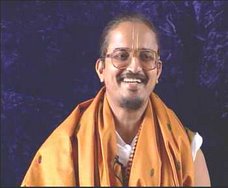Nama Article 16th December 2013
The holy month of Mrigashira ('Margazhi') commenced on December 16th. It is an age-old practice to wake-up early in the morning and go on the streets braving the cold, performing Nama Sankirtan. Hundreds of different GOD Chapters across the country perform Margazhi Nagara Sankirtan on all the 30-days of the month. Namadwaar shall bring to you video clips from these chapters - one chapter a day. Visit http://www.namadwaar.org/home.php to view the vidoes
Excerpts from a discourse by our Sri Sri Muralidhara Swamiji
Beginning from 'Sayana Ekădasi' to 'Uthhăna Ekădasi' one should perform penance ('tapas'). What is the reason? Bhagavăn Himself is asleep. Bhagavăn's sleep is known as yogic sleep ('Yoga nidra'). Why has Bhagavăn gone into Yogic sleep? Our one completed year is equal to a day of the Devas. In that one day, beginning from 'Sayana Ekădasi' to 'Uthhăna Ekădasi' the Devas are also asleep. When do these Devas who are asleep, wake up? They wake up in this month of Mărgazhi. Our Mărgazhi month is 'prătha kăla', i.e. 3 to 5 in the morning, for the Devas. The Devas wake up at 'prătha kăla'. What do these Devas who wake up in the early hours of morning do? It is said that there is no Perumăl in Deva loka. Devas do not have Perumăl but it is said that Vishnu does exist in heaven as Upendra. Though this Upendra is 'seen' by them He does not exist in the form of a deity ('archhăvatara') as in a Temple. But, when the Devas desire to worship Bhagavăn where do they go? It is said that they come down to the earth. On the earth they worship the Perumăl in the various Temples, have His darshan. Since these Devas come to the earth in 'prătha kăla' we should wake up at this time. What is the meaning of drawing huge 'kolams' at the door of the house? The Devas pass the streets. In each and every 'Răja veedhi' or wherever there is a Perumăl temple one finds South sannidhi street, north sannidhi street, etc... The Devas visit such Holy places ('kshetras') on the earth; hence, we should draw big kolams at the door. So, 'Mărgazhith thingal', ---- Since the Devas wake up early in the morning and worship Bhagavăn we should also worship Him.
In the Gita, Bhagavăn says, "Amongst the months I AM Mărgazhi." - 'Măsănam Mărgasheershoham' Mărgazhi month is said to be an inauspicious one ('peedai măsam'). Marriages and other auspicious functions are not conducted in this month. When Bhagavăn spells out that amongst the month He is Mărgazhi, why is this month considered inauspicious? In fact, this should be a revered/most favourable month. One should be able to conduct marriages, house warming ceremony or any other auspicious function in this month. But I pondered over, "why have the Mahăns termed this month as inauspicious?" And the conclusion that I drew is that if performance of marriages or any other auspicious function were permitted in this month then our minds would continue to be drowned only in such worldly affairs! At least, this one-month let the people worship the Lord! Is this not the period to worship Bhagavăn? This is the time to worship. Is it not? Early morning perform 'Thiruărădhana' for Bhagavăn, perform Năma Sankirtana, meditate ('dhyăna'). Since this one-month (the thirty days) is early morning ('prătha kăla') for the Devas, people should be made to involve themselves only in spiritual matters. Hence, they have been forbidden us from conducting such worldly functions! This is the reason for labeling this month as inauspicious!
Please check these: Excerpts from a discourse by our Sri Sri Muralidhara Swamiji
Singing the glory of the One who appears foremost in the Vedas and dance about in the streets
Why did he say that one should dance about on the streets (singing the glory of the Lord)?
Chant the Mahamantra Nama kirtan :
Hare Rama Hare Rama Rama Rama Hare Hare
Hare Krishna Hare Krishna Krishna Krishna Hare Hare

No comments:
Post a Comment